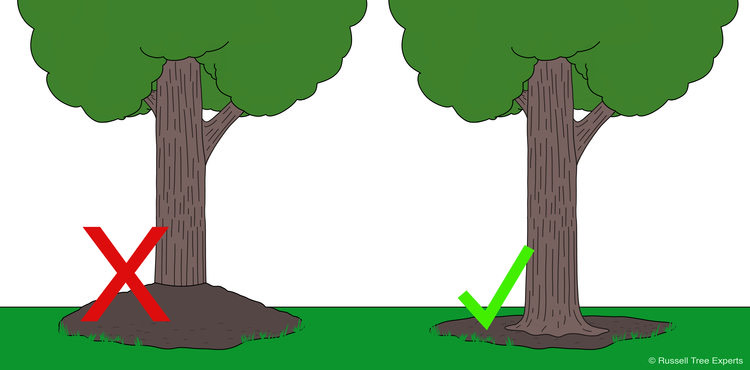By: Aidan Stewart

As we kick off 2023 and creep toward spring, many homeowners are beginning to think about their yards. One of the most common landscape tasks is mulching. What should be a simple task often gets overly complicated or done improperly, so here are a few things to consider before you begin mulching your yard.
Mulch falls into two categories: Organic and inorganic. Organic mulch is material such as wood chips, pine straw, grass clippings, etc. Inorganic mulch is often rubber chips or gravel.
Which mulch type is better?
Both options can serve quite a few functions in your yard, such as weed suppression, erosion control, temperature regulation, and moisture retention. Organic mulch, however, has the added benefit of conditioning and improving soil health as it breaks down. As an arborist, 9 times out of 10 I’m going to recommend organic mulch due to that bonus.
How much mulch should I apply?
Typically, trees and shrubs only need a few inches of mulch, usually around 2-4 inches. If you mulch every year, there’s likely already a layer down on the ground, and all you need to do is top dress to bring it to that height. Trees too often receive the “mulch volcano” treatment, which is extremely detrimental to their health and longevity.
The Mulch Volcano Problem:

- Girdling roots: When mulch is built up, tree roots grow thinking they’re underground. They begin to encircle the tree’s trunk within the mulch volcano and constrict it. This is a very common factor in tree decline.
- Decay: Excessive mulch traps excess moisture. Moisture left against the tree’s trunk plus roots that should otherwise be exposed will lead to wood rot.

- Dried-out soil: Eventually, the excess mulch will begin to compact and dry out, so water will run off the top and not permeate into the tree’s roots, essentially defeating the purpose of the mulch.
- Trapping moisture: In situations where excess moisture is already an issue, volcano mulching can trap water for longer than desired and exacerbate issues with over-watering.
